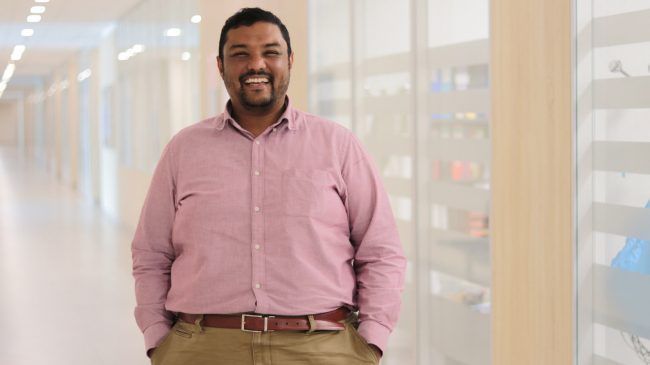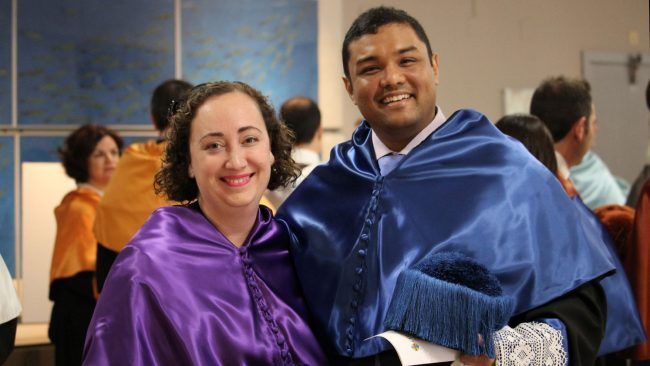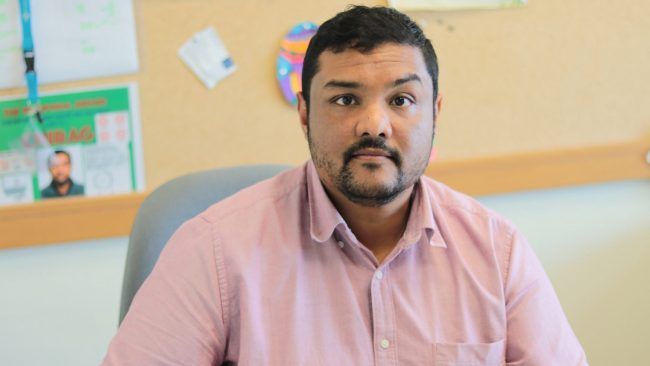It has been quite some time since Doctor Chirag Sheth, microbiologist specialized in immunology and fungal diseases joined our University staff. So, it’s about time we get to know him a bit better. As academic coordinator of the Dentistry Degree, Erasmus+ coordinator, lecturer and active researcher, he is always running from one place to another. Luckily for us, he managed to find some time to have a chat.

Chirag moved to the UK as a student, starting his undergraduate degree in Canterbury. He stayed there till after his PhD, and then decided to move to Scotland for his post-grad in Aberdeen. In between these degrees, he gained practical experience by participating in a work placement: “I took out a year to go and work at GlaxoSmithKline. It is a company that is active in the pharmaceutical sector. I was working on new drugs, more specific, drugs to control chronic pain.”
A passion for science, research, and teaching
After his post-doc, Chirag worked a year in wine-research and then started to work for the ‘Consejo Superior de Investigación Científicas’. This is a research institute of the Spanish government. “Like so many students with a similar degree, I graduated thinking I was going to be a full-time researcher. I ended up, just like many others, discovering that what you dream of often doesn’t include mundane aspects if life, such as paying the rent.” Chirag never expected to end up as a professor at university, but he has grown to like it.
Chirag, what is it like teaching in an international university like CEU?
I think that one has to demonstrate a big capacity of empathy and flexibility to work at CEU Valencia. Here you have to interact, you need to be keen to interact because you have to share your knowledge, your experiences.
“the quality, engagement, and difference our students receive in education here make them more desirable in other countries.”
Being a teacher working in a Spanish line is completely different to being a teacher in such an international and diverse environment like the Dentistry degree. We are constantly being challenged, changing the way we perceive our culture and the way we do things. This keeps us constantly thinking about more than just ourselves, it forces us to look out. And because of that I find it an honor to work here because it improves my understanding of the world, my interaction with different people, and it also teaches me not to judge things, not to pre-decide things: you just have to be constantly open.
It is obvious that students present different challenges as they come from very different backgrounds, they have different expectations and motivations. And teachers need to incorporate all of these into their teaching. It is not as simple as just presenting a strategy and expecting everybody to get on board: I always adapt my teaching based on what students say and through a deep understanding of their motivations. I love teaching in this international program, I wouldn’t exchange it for anything in the world. It keeps me alive, it keeps me going and it really is a passion, it is a passion project!
Do you think it is beneficial to students to follow an international program?
Many of our alumni come to visit us when they are in the area, and that is always a good sign! A British student who recently came back to CEU told us that she always talks to her colleagues in the UK and she feels the quality, engagement, and the difference she received here makes her more desirable in Britain. Spanish dentists are sought after because of their high level of education. What is more, our alumni tell us that studying here has been a changing point in their lives, and that they are proud of studying here and always fly the flag when they go home!
I think you could say that studying in an international environment gives you a greater perspective and allows you to work in a multinational team, which has to be useful to you and your professional future. It has to do with soft skills, which are greatly valued today, like the ability to communicate, to adapt, to integrate yourself. What we offer here is precisely that.
Sharing knowledge with his students
Many of Chirag’s courses are researched-based topics. The more he gets to combine his passion for research with his lectures, the better. But teaching is only a part of Chirag’s responsibilities, there are in fact too many to list here.
One of your current projects is writing a book, a guide for students enrolled in the Dentistry Degree, how is that going?
I realize there are a lot of books out there based on the same idea, but I feel like they always miss certain usability. They’re often either too thick, too wordy, there’s a clunky organization, etc. Now I get the opportunity to create a book that follows my vision. My goal is that the students can take it with them when they’re doing practice in the clinic, so they have something to fall back on when they need a quick reminder.
“I would like to say that CEU IS A great place to work. Not only am I surrounded by a lot of enthusiasm, BUT i also find an interesting mix of people around here.”
You could imagine this book to look something like a book of flashcards, a quick reference book for Dentistry students…
You will find information on every course, with the necessary images, graphs, protocols, etc. I am working on this book with a student, because the interesting thing about this book is that it will not be the professors’ point of view, but also the students. I think it’s important that reference books have the information students feel like they need. Otherwise, it’s just another course book and that is not what I want.

I would also like to join forces with Doctor Salvador Merida and publish the analysis of the stress-levels of the students throughout the year via a substance, called cortisol, which can be found in the saliva. When you are stressed, your body produces more cortisol, which gets thrown into your saliva. This ambitious project has not been done by many universities and has never been done by us at CEU.
I know it is a big project, but it is also innovative and interesting. Tracking this is only the first step though. Once you have a clear view of the stress-levels of the students during the year, you can start working out strategies on how to deal with it.

Recently, Doctor Chirag Sheth was named as a collaborating expert of the European Centre for Disease Control, located in Sweden. “This is an extensive institution that controls the health-outcomes of millions of people in Europe. I am a recognized expert on their panel and this is something I am very proud of. There is only one other professor at CEU who is affiliated with them, so it definitely sets a benchmark.”
New challenges, new perspectives
Chirag, is there anything you would like to change about your job?
I would definitely like to have more time to talk with students. Specifically more time with the students that are enrolled in my subjects. I’ve been thinking about organizing an external visit for one of my subjects for years now, but I just never have the time. This is something I would really like to do. It’s very interesting for the students and always more fun than a regular lecture.
Other than that, I would like to say that I think this is a great place to work. Not only am I surrounded by a lot of enthusiasm, which gives me energy to push forward, you will also find an interesting mix of people around here. Often, I have thought-provoking conversations with very bright people, which inspires me in my work every day!









